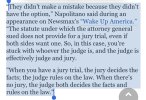In What Ways Does Trump's Attack Strategy Help Him?
With the first day of the New York v. Trump fraud trial complete, we may have an idea how subsequent days will be. The trajectory and tone can of course change, but day one of this trial that is expected to last three months may be the template.
Having already been found liable for fraud (count 1 of 7), and knowing his New York business certificates have already been canceled (making it soon illegal for Trump to operate those businesses), and knowing those businesses will soon be taken away from Trump to be dissolved by a court-appointed receiver, Trump sat silently in court as the six other counts are tried.
Not allowed to speak, Trump sat silent as he listened to the opening arguments against him. And he sat silent as he watched the first witness, a former Trump accountant, testify in support of the fraud case the DA's is making. The accountant shared intimate (and damning) details that reveal the inside workings of Trump's businesses.
Trump's response was to head directly to the cameras and microphones during breaks to viciously condemn the trial, the judge, and the prosecutor. He did not make legal arguments against them. He instead publicly raged with vitriolic name-calling rants.
Trump's response is no accident. It is clearly intentional. My question is, is it working? How does it help Trump to respond in this way? When Trump's fate and the fate of his companies rest, not in Trump's hands, but in the hands of a single judge in a bench trial, it seems counterproductive to viciously attack and label that judge. But Trump is doing it every chance he gets.
Why? How does this help Trump?
This is clearly something Trump wants to do. While he is not required to attend this trial, unless he is called to testify as a witness, he showed up yesterday and he is returning today.
With the first day of the New York v. Trump fraud trial complete, we may have an idea how subsequent days will be. The trajectory and tone can of course change, but day one of this trial that is expected to last three months may be the template.
Having already been found liable for fraud (count 1 of 7), and knowing his New York business certificates have already been canceled (making it soon illegal for Trump to operate those businesses), and knowing those businesses will soon be taken away from Trump to be dissolved by a court-appointed receiver, Trump sat silently in court as the six other counts are tried.
Not allowed to speak, Trump sat silent as he listened to the opening arguments against him. And he sat silent as he watched the first witness, a former Trump accountant, testify in support of the fraud case the DA's is making. The accountant shared intimate (and damning) details that reveal the inside workings of Trump's businesses.
Trump's response was to head directly to the cameras and microphones during breaks to viciously condemn the trial, the judge, and the prosecutor. He did not make legal arguments against them. He instead publicly raged with vitriolic name-calling rants.
Trump's response is no accident. It is clearly intentional. My question is, is it working? How does it help Trump to respond in this way? When Trump's fate and the fate of his companies rest, not in Trump's hands, but in the hands of a single judge in a bench trial, it seems counterproductive to viciously attack and label that judge. But Trump is doing it every chance he gets.
Why? How does this help Trump?
This is clearly something Trump wants to do. While he is not required to attend this trial, unless he is called to testify as a witness, he showed up yesterday and he is returning today.
Last edited:



